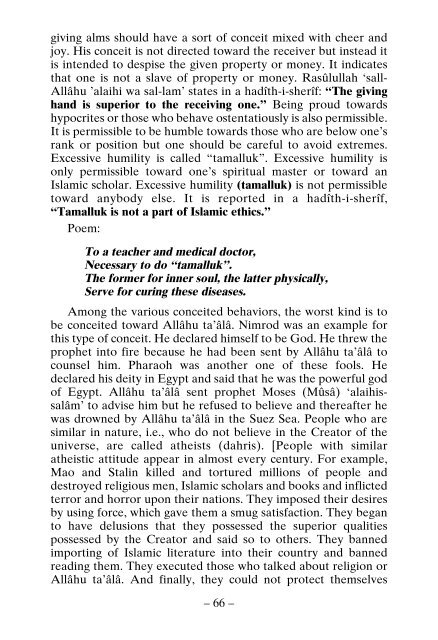Ethics of Islam
Ethics of Islam is taken from the book Berîka by Muhammad Hâdimi. Immorality and ways to get rid of it; 40 depravities and cures to them; usefulness of ethics; what is a soul; strengths of a soul; Personalities emanating from wisdom, courage, chastity and justice are extensively explained.
Ethics of Islam is taken from the book Berîka by Muhammad Hâdimi. Immorality and ways to get rid of it; 40 depravities and cures to them; usefulness of ethics; what is a soul; strengths of a soul; Personalities emanating from wisdom, courage, chastity and justice are extensively explained.
Create successful ePaper yourself
Turn your PDF publications into a flip-book with our unique Google optimized e-Paper software.
giving alms should have a sort <strong>of</strong> conceit mixed with cheer and<br />
joy. His conceit is not directed toward the receiver but instead it<br />
is intended to despise the given property or money. It indicates<br />
that one is not a slave <strong>of</strong> property or money. Rasûlullah ‘sall-<br />
Allâhu ’alaihi wa sal-lam’ states in a hadîth-i-sherîf: “The giving<br />
hand is superior to the receiving one.” Being proud towards<br />
hypocrites or those who behave ostentatiously is also permissible.<br />
It is permissible to be humble towards those who are below one’s<br />
rank or position but one should be careful to avoid extremes.<br />
Excessive humility is called “tamalluk”. Excessive humility is<br />
only permissible toward one’s spiritual master or toward an<br />
<strong>Islam</strong>ic scholar. Excessive humility (tamalluk) is not permissible<br />
toward anybody else. It is reported in a hadîth-i-sherîf,<br />
“Tamalluk is not a part <strong>of</strong> <strong>Islam</strong>ic ethics.”<br />
Poem:<br />
To a teacher and medical doctor,<br />
Necessary to do “tamalluk”.<br />
The former for inner soul, the latter physically,<br />
Serve for curing these diseases.<br />
Among the various conceited behaviors, the worst kind is to<br />
be conceited toward Allâhu ta’âlâ. Nimrod was an example for<br />
this type <strong>of</strong> conceit. He declared himself to be God. He threw the<br />
prophet into fire because he had been sent by Allâhu ta’âlâ to<br />
counsel him. Pharaoh was another one <strong>of</strong> these fools. He<br />
declared his deity in Egypt and said that he was the powerful god<br />
<strong>of</strong> Egypt. Allâhu ta’âlâ sent prophet Moses (Mûsâ) ‘alaihissalâm’<br />
to advise him but he refused to believe and thereafter he<br />
was drowned by Allâhu ta’âlâ in the Suez Sea. People who are<br />
similar in nature, i.e., who do not believe in the Creator <strong>of</strong> the<br />
universe, are called atheists (dahris). [People with similar<br />
atheistic attitude appear in almost every century. For example,<br />
Mao and Stalin killed and tortured millions <strong>of</strong> people and<br />
destroyed religious men, <strong>Islam</strong>ic scholars and books and inflicted<br />
terror and horror upon their nations. They imposed their desires<br />
by using force, which gave them a smug satisfaction. They began<br />
to have delusions that they possessed the superior qualities<br />
possessed by the Creator and said so to others. They banned<br />
importing <strong>of</strong> <strong>Islam</strong>ic literature into their country and banned<br />
reading them. They executed those who talked about religion or<br />
Allâhu ta’âlâ. And finally, they could not protect themselves<br />
– 66 –

















